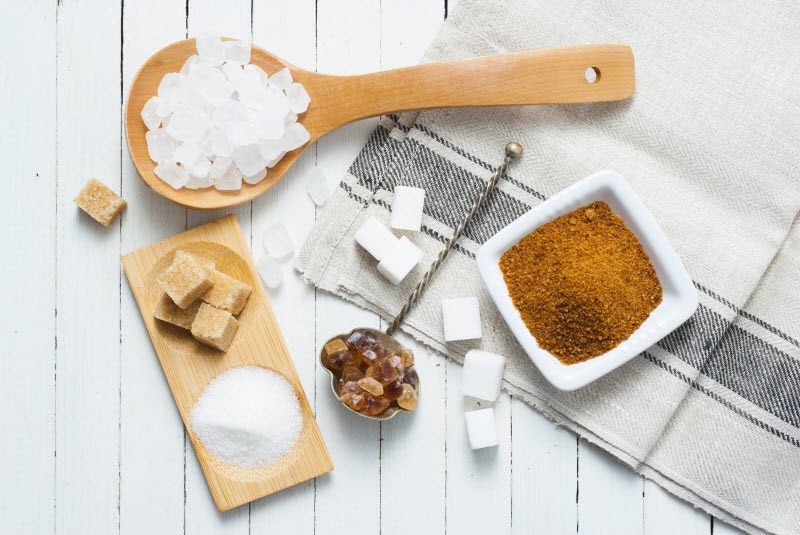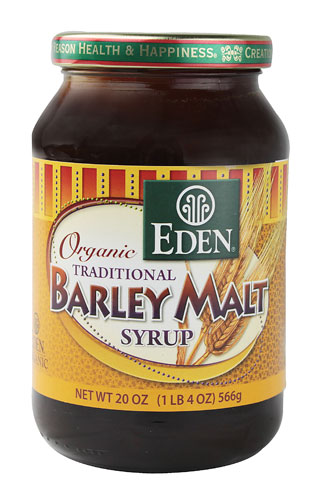Sugar is ubiquitous in our food supply, in everything from literally soup to nuts. Unfortunately, recognizing sugar on a label can be confusing, since sugar has so many forms. It’s helpful to know all the names that the sweet stuff goes by, so you can identify its presence and track your intake. Keeping tabs on sugar consumption helps you stay on top of a myriad of health concerns, from diabetes to obesity.

Here to help you navigate the sugar spectrum is our glossary, which details the most common names of
added sugars of all stripes. But first, a sugar/carbohydrate overview, which offers a broader context for the main sugar categories.
What is sugar?
Sugar occurs naturally in all foods that contain carbohydrates, such as fruits and vegetables, grains and dairy.
Carbohydrates come in two basic forms: simple and complex. The difference between the two is how quickly they are metabolized, which is determined by their chemical structure. Consuming complex, unprocessed whole foods that contain natural sugar, generally speaking, is preferred for your health.
What is added sugar?
The problems arise when you consume too much added sugar. Food manufactures add sugar to products not only to impart sweetness, but to add texture, enhance color and extend shelf life.
Added sugar is not so sweet for your health.
Consumption of added sugars has been linked to an increased risk of a variety of chronic diseases including obesity, cardiovascular disease, diabetes and non-alcoholic fatty liver disease (NAFLD) as well as cognitive decline and even some cancers.
On nutrition labels, added sugars goes by a myriad of names, including brown sugar, corn syrup, fructose, glucose, maltose, sucrose and honey, just to name a few. In recent years, the
FDA has mandated that by July 2021 all nutrition labels, directly beneath the total sugar count, must clearly identify the amount of added sugars per serving in the product.
Sugar can be pervasive—and elusive. To help you recognize the four most common types of simple sugars, we’ve highlighted them here.
Glucose
The body’s main source of energy, also known as blood sugar, and is a simple sugar found in food such as pasta, whole grain bread, legumes and a range of vegetables.
Fructose
This ‘fruit sugar’ is found in foods such as fruit, honey, some vegetables and soft drinks.
Lactose
Dairy sugar or ‘milk sugar’ found in foods such as legumes, dairy products and dried figs.
Sucrose
Sucrose is common sugar derived from cane or beet sugar composed of two monosaccharides, glucose and fructose.
Popular Types of Sugar
Here is a more extensive list of many of the types of sugar you might find on a nutrition label.
Agave Nectar
Agave nectar is a high-fructose sweetener commercially produced from agave, a type of succulent plants that grows in warm climates, particularly the southwestern United States and Mexico.
Asparatame
Aspartame, sold under the brand names NutraSweet and Equal, is one of the most popular artificial sweeteners available and 200 times sweeter than sugar.
Barley Malt Syrup
Barley malt syrup is an unrefined sweetener, dark brown, thick and sticky, produced from malted barley and about as half as sweet from refined white sugar.
Brown Sugar
Sugar crystals contained in a molasses syrup, with natural flavor and color; over 90 percent sucrose.
Brown Rice Syrup
Brown rice syrup, also known as rice syrup or rice malt, is a sweetener produced by fermenting cooked brown rice and about half as sweet as sugar.
Cane Juice
Cane juice means water containing the sucrose extracted from crushed sugarcane.
Cane Sugar
Cane sugar means sugar derived from sugarcane including sugar produced from sugarcane molasses.
Coconut Sugar
Coconut sugar is a natural sugar made from coconut palm sap, which is the sugary fluid that circulates throughout the coconut plant.
Corn Syrup
A sugar that has been extracted from corn and processed into a liquid form.
Corn Syrup Solids
For corn syrup solids, corn syrup is dehydrated until most of the water has been removed.
Dextrose
Dextrose is the name of a simple sugar that is made from corn and is chemically identical to glucose, or blood sugar. Dextrose is often used in baking products as a sweetener and can be commonly found in items such as processed foods and corn syrup.
Evaporated Cane Juice
The only difference between evaporated cane juice and common white sugar is that sugar is processed by stripping it of all traces of molasses, while evaporated cane juice still has some little flecks of molasses that give it a darker color.
High Fructose Corn Syrup
High fructose Cory Syrup (HFCS) is a very sweet derivative of corn starch.
Honey
Honey is a sweet, viscous fluid produced by bees from the nectar collected from flowers and used as a spread or sweetener.
Invert Sugar
Invert sugar, sometimes referred to as invert sugar syrup or invert syrup, is a liquid sweetener made from mixing granulated table sugar with heated water.
Maltodextrin
Maltodextrin is a white powder made from corn, rice, potato starch, or wheat. While closely related to corn syrup solids, maltodextrin is less than 20 percent sugar.
Maltose
Maltose is a complex, double sugar that forms when starches like potatoes or rice are broken down, or fermented, in the digestive system.
Maple Syrup
Maple syrup is made from the circulating fluid, or sap, of sugar maple trees which is boiled to create a thick syrup.
Molasses
Molasses is a thick, dark syrup that’s a byproduct of the sugar-making process.
Neotame
Neotame, similar to aspartame, is a relatively new artificial sweetener that has yet to become a household name.
Palm Sugar
Palm sugar, often confused with
coconut palm sugar, can come from any palm tree, such as the Palmyra, date, nipa, sugar and coconut palms.
Raw Sugar
Raw sugar (also known as
turbinado sugar) is another byproduct of sugar making that’s distinct for its caramel color and larger crystal size.
Saccharin
Saccharin is an artificial sweetener about 300–400 times as sweet as sucrose but has a bitter or metallic aftertaste, especially in high amounts.
Stevia
Stevia, also known as Truvia and
Stevia in the Raw, is a plant that derives from the ragweed family. Commercial stevia comes from a highly refined stevia leaf extract called rebaudioside A (Reb-A). It has no calories but has a mild, licorice-like taste that’s slightly bitter.
White Granulated Sugar
Granulated sugar, made from sugar cane, is also called table sugar or refined sugar. It has had all of the naturally present molasses refined out of it and is the most ubiquitous form of sugar.
 Here to help you navigate the sugar spectrum is our glossary, which details the most common names of added sugars of all stripes. But first, a sugar/carbohydrate overview, which offers a broader context for the main sugar categories.
Here to help you navigate the sugar spectrum is our glossary, which details the most common names of added sugars of all stripes. But first, a sugar/carbohydrate overview, which offers a broader context for the main sugar categories.



